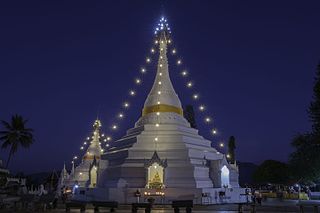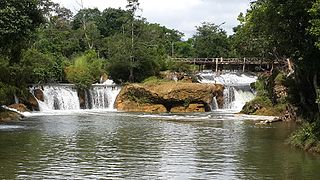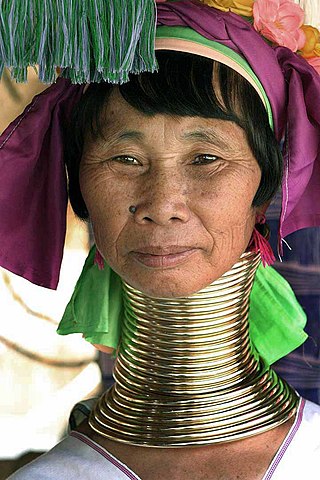
The Lan Na Kingdom or The Kingdom of Lanna, also known as Lannathai, and most commonly called Lanna or Lanna Kingdom, was an Indianized state centered in present-day Northern Thailand from the 13th to the 18th centuries.

Mae Hong Son province, also spelled Maehongson, Mae Hong Sorn or Maehongsorn, is one of Thailand's seventy-six provinces (changwat). It lies in upper northern Thailand and is the westernmost province. Neighboring provinces are Shan State of Myanmar, Chiang Mai and Tak. To the west, the province borders Kayin State and Kayah State of Myanmar.

A refugee camp is a temporary settlement built to receive refugees and people in refugee-like situations. Refugee camps usually accommodate displaced people who have fled their home country, but camps are also made for internally displaced people. Usually, refugees seek asylum after they have escaped war in their home countries, but some camps also house environmental and economic migrants. Camps with over a hundred thousand people are common, but as of 2012, the average-sized camp housed around 11,400. They are usually built and run by a government, the United Nations, international organizations, or non-governmental organization. Unofficial refugee camps, such as Idomeni in Greece or the Calais jungle in France, are where refugees are largely left without the support of governments or international organizations.

Kayah State, or Karenni State, is a state of Myanmar. Situated in eastern Myanmar, it is bounded on the north by Shan State, on the east by Thailand's Mae Hong Son Province, and on the south and west by Kayin State. It lies approximately between 18° 30′ and 19° 55′ north latitude and between 96° 50′ and 97° 50′ east longitude. The area is 11,670 km2 (4,510 sq mi). Its capital is Loikaw. The estimated population in the 2014 Myanmar Census was 286,738, the smallest among Myanmar's seven states. It is inhabited primarily by the Karenni ethnic group, also known as Red Karen or Kayah, a Sino-Tibetan people.

The Karen, also known as the Kayin, Kariang or Kawthoolese, are an ethnolinguistic group of Tibeto-Burman language-speaking people. The group as a whole is heterogeneous and disparate as many Karen ethnic groups do not associate or identify with each other culturally or linguistically. These Karen groups reside primarily in Kayin State, southern and southeastern Myanmar. The Karen account for around 6.69% of the Burmese population. Many Karen have migrated to Thailand, having settled mostly on the Myanmar–Thailand border. A few Karen have settled in the Andaman and Nicobar Islands, India, and other Southeast Asian and East Asian countries.

Force 136 was a far eastern branch of the British World War II intelligence organisation, the Special Operations Executive (SOE). Originally set up in 1941 as the India Mission with the cover name of GSI(k), it absorbed what was left of SOE's Oriental Mission in April 1942. The man in overall charge for the duration of its existence was Colin Mackenzie.

The village of Bang Rachan was in the north of Ayutthaya, the old capital of Siam, the predecessor state of modern Thailand. Today their village is located in Khai Bang Rachan District of Sing Buri Province. The village is remembered in Thai popular history for its resistance against the Burmese invaders in the Burmese–Siamese War (1765–1767) that ended the Ayutthaya Kingdom.
The Nai Soi Community Learning Center (NSCLC) is a non-profit ecologically sustainable school for high school aged refugee children from Burma. The NSCLC is located in the village of Nai Soi, in Mae Hong Son Province, Thailand.

The Kayan are a subgroup of the Red Karen, a Tibeto-Burman ethnic minority of Myanmar (Burma). The Kayan consists of the following groups: Kayan Lahwi, Kayan Ka Khaung (Gekho), Kayan Kadao, Kayan Lahta, Kayan Ka Ngan, Kayan Kakhi, and sometimes, Bwe people (Kayaw). They are distinct from and not to be confused with the Kayan people of Borneo.
The Women's League of Burma is a community-based organisation working on the rights of women from Burma, with a focus on systematic sexual violence in ethnic areas, and women's involvement in political processes, especially in the peace process. It is a membership organisation comprising various ethnic minority women groups from Burma.

Myanmar has been embroiled in armed conflict since 1948, when the country, then known as Burma, gained independence from the United Kingdom. The conflict has largely been ethnic-based, with ethnic armed organisations fighting Myanmar's armed forces, the Tatmadaw, for self-determination. Despite numerous ceasefires and the creation of autonomous self-administered zones in 2008, armed groups continue to call for independence, increased autonomy, or the federalisation of Myanmar. It is the world's longest ongoing civil war, spanning almost eight decades.

Openmind Projects (OMP), in Nong Khai Province, Thailand is a developmental aid organisation focused on helping communities in Thailand, Laos, Cambodia, and Nepal through the creation and management of grass roots projects in the areas of e-learning, education, and environment. The focus of the organisation is using information and communication technologies (ICT) to educate individuals in schools, orphanages, national parks, and villages. Projects rely on volunteers to promote changes in local communities.
Nai Soi is a small village located in Mae Hong Son Province in northern Thailand. The village is under the administration of the Thai authorities. Nai Soi is about three kilometers from the Ban Mai Nai Soi Karenni refugee camp. Nai Soi is about 20 kilometers from the town of Mae Hong Son, along a paved road accessible year-round. It is perhaps most well known for the refugee camp found there and for having the largest Karenni settlement of the three villages. Thai authorities view Ban Mai Nai Soi as a self-sustaining refugee camp.
The Karen Human Rights Group (KHRG) is a grassroots Karen-led human rights organisation, established in Karen State during 1992 and it is now operating across rural southeast Burma/Myanmar. With over twenty years of experience. KHRG is recognised internationally as an authority on major issues such as internal displacement, forced labour, landmines, conflict and land confiscation in southeast Burma/Myanmar. KHRG works directly with "rural villagers who are suffering abuses such as forced labor, systematic destruction of villagers and crops, forced relocations, extortion, looting, arbitrary detention, torture, sexual assault and summary executions." Most of these abuses were committed by soldiers and officials of the State Peace & Development Council (SPDC), Burma's previous ruling military junta. The organisation's goal is to support villagers in rural Burma, by helping them develop strategies to resist abuse and by translating their testimonies for worldwide distribution, accompanied by supporting photos and documentary evidence.

Mae La, alternatively spelled Maela, or Beh klaw, is a refugee camp in Thailand. It was established in 1984 in Tha Song Yang District, Tak Province in the Dawna Range area and houses 50,000 Karen refugees; the number continues to rise as of June 2019. Mae La is the largest refugee camp for Karen refugees in Thailand. Over 90% are the persecuted ethnic Karen. The camps are overseen and run by the Thailand Burma Border Consortium (TBBC), a union of 11 international non-governmental organizations that provide food, shelter and non food items to the Burmese refugees and displaced people.
On 22 March 2013, a fire at the Ban Mae Surin refugee camp in Mae Hong Son Province, Thailand, killed 37 Karen refugees from neighbouring Myanmar, as well as destroying hundreds of dwellings. Thought to have started following a "cooking accident", the fire began at around 16:00 local time, and extinguished around two hours later. The fire had been spread by hot weather combined with strong winds.

The Karen conflict is an armed conflict in Kayin State, Myanmar. It is part of the wider internal conflict in Myanmar between the military government and various minority groups. Karen nationalists have been fighting for an independent state, known as Kawthoolei, since 1949. The Karen National Union (KNU) and its Karen National Liberation Army (KNLA) are the most prominent Karen rebel groups. Hundreds of thousands of civilians have been displaced by the conflict, many of whom fled to neighbouring Thailand and survive in refugee camps.
Karen Americans are Americans of full or partial Karen ancestry. They are a recent but rapidly growing immigrant population in the United States. Many Karen who emigrate are refugees as a result of violence in their homeland. Many come either from their traditional homeland of Kawthoolei in Myanmar or from refugee camps in Thailand. Minnesota was reported to have had more than 12,000 Karen residents in 2017, making it the state with the largest Karen community. Other states with significant populations are California, Texas, New York, and Indiana.
Huay Pu Keng is a village located in the Mae Hong Son province, in the northwest of Thailand. The village is inhabited by the Tai Yai, a Thai ethnic community and four subgroups of the Karenni people, namely the Kayan, Kayaw, Red Karen and Pakayor. The Kayan women in particular became famous because tourists began to find interest in their long necks with brass rings.
The Battle of Mese took place during the first half of 2023 for control of Mese Township on the border between Myanmar and Thailand in Kayah State. The battle was a part of the current Myanmar civil war.











